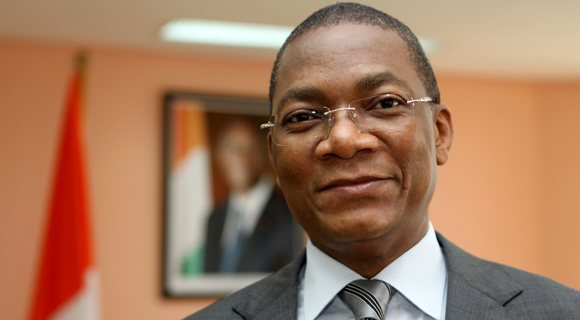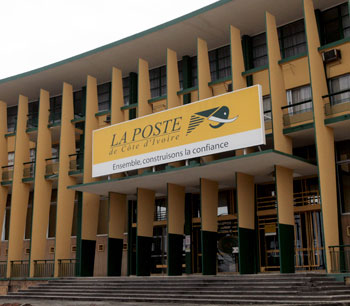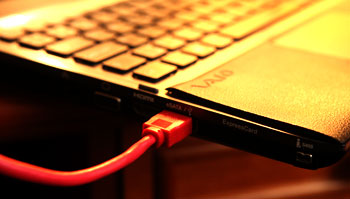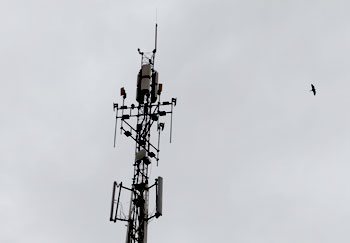ICT Sector Côte d’Ivoire
H.E. Bruno Nabagné Kone, Minister of Post and ICT of Côte d’Ivoire
ICT in Côte d’Ivoire has a relatively mixed status in the country’s economy. There has been a very strong evolution over the past fifteen years. The penetration rate is now approaching seventy-five percent which is relatively high compared to the African average. GSM remains to be the main communication tool. The country is lagging behind in the issue of Internet.
Interview with H.E. Bruno Nabagné Kone, Minister of Post and ICT of Côte d’Ivoire

The government’s ambition is to transform the country within a decade nto a society where the economy is based on knowledge by means of a strong and sustainable deployment of ICT and the emergence of a national ICT policy. What are the main pillars of the strategy?
This ambition originated because the ICT permeates every sector of economic activity, such as the agricultural, industrial, and service sectors. All these sectors are affected one way or another by the intrusion of ICT. It is an economic fact that must be considered. Although the country is one of the few that has unfortunately fallen behind in terms of development, it is now able to catch up with the help of new technological communication because there is no need for raw materials or heavy machinery, rather, there is a need for intelligence.
On this basis, the country is fortunate enough to have a relatively strong, dynamic, and intelligent youth. It therefore relies heavily on the appropriation of this technology, integrating them in the processes and making sure that the economy is transformed through this new medium.
What is the status of the ICT sector in Côte d’Ivoire? What are the main challenges and opportunities for investors in the sector?
ICT has a relatively mixed status in the economy. It had a very strong evolution over the past fifteen years since the launch of ICT in Côte d’Ivoire along with the successful advent of the mobile phone. It now has a penetration rate approaching 75%, which is relatively high compared to the African average. But GSM is still the main communication tool.

Côte d’Ivoire’s ambition is to make ICT atool that contributes to economic development. To do so, Côte d’Ivoire aims at developing the Internet beyond the traditional aspect of communication and making it a tool to trade, train, purchase, and sell. In this manner, the country will be able to transform its ICT sector into a tool that can impact the economy. To achieve this goal, the country must create the conditions for implementing an effective technological infrastructure.
What are the opportunities for investors in the sector?
There are many opportunities for investors in the ICT sector. Until now, it was mainly in mobile telephones. There are seven mobile operators in Côte d’Ivoire and an important international operator behind each of them. The goal is to transfer these investments by foreign investors into heavy infrastructure, particularly into the international connectivity.
Côte d’Ivoire is currently having discussions with some of the biggest international operators who are able to implement this vision starting in 2012. We need to build and extend the fiber optic network to be able to reach the largest part of the population. We expect foreign investors to approach the Ministry and support us in this project.
Does political instability represent a concern for the country, the Ministry of Posts and ICT and for investors? To what extent has the country been affected by this instability? Will it affect investment opportunities?
The political instability is over. It’s true that the country has experienced many difficulties during the past decade. But during the last five years, every possible action was taken to move past this instability. Although there have been recurring political crises over the 2010 elections, Ivoirians decided to implement measures to reach a credible and transparent election in the last election. Unfortunately, this plan was not executed properly and the election in 2010 was marred by violence again.
Today, the violence has stopped and its effects have disappeared. We have a nation that is at work and revitalized. The investors have regained confidence; our partners in development have gained confidence and are returning to Côte d’Ivoire. I’m not worried about Côte d’Ivoire; on the contrary, I think that things are much better than we think.
Today, the violence has ended and its effects have disappeared. Côte d’Ivoire is a nation that is at work and revitalized. Investors have regained confidence; our partners in development have gained confidence and are returning to Côte d’Ivoire. They are not worried about Côte d’Ivoire. On the contrary, matters are much better than anyone may presume.
Discuss the new regulatory framework. What is the state of the liberalization of the Ivorian ICT sector?
The regulatory framework that still governs communication in Côte d’Ivoire is very simple and dates back to 1985. In ICT time, this corresponds to prehistoric times. Cybercrime, VoIP, and many other concepts appeared much later. Unfortunately, previous political instability in Côte d’Ivoire resulted in an unchanged framework governing the sector. That’s why the priority in the next month is to revise this framework.
In terms of liberalization, the ICT sector is a fully liberalized one. There are no public operators and the state government itself is only a minority shareholder in the former traditional mobile operator. All other operators are private companies. There are still some monopolies, but they will gradually disappear. Furthermore, the liberalization process particularly concerns international connectivity. Until now, there was only one cable assuring this connectivity and it is was a private one. So now the ICT sector can be considered fully liberalized.
In what areas is Côte d’Ivoire lagging behind? How is local business encouraged?
Côte d’Ivoire had great success in implementing the GSM system. Compared to other African countries, it is considered to be in the high average. However, Côte d’Ivoire is lagging behind concerning Internet implementation, deployment, usage, and appropriation by the population. These are the country’s priorities. We are workingon the infrastructure to ensure that it is strong enough to fulfill the demand, especially since Côte d’Ivoire is expecting a strong change in Internet demand. We at the Ministry are also working on making international access easier for everyone. Work must also be done on the population so that once Internet access is enabled, people will have the tools to allow easier and more effective use of the Internet.
One of the modern ways to access the Internet is through the mobile phone. The WiMAX is a solution with 800,000 subscribers. GSM has a stronger market with 15 to 16 million subscribers, which means there are at least 15 million potential subscribers to the Internet. Many subscribers already have smartphones with the ability to connect to the Internet, but it’s not the same as using it on their computer. Côte d’Ivoire has the ambition to modify the regulatory framework in order to launch the 3G network in the country. Unfortunately, Côte d’Ivoire was delayed in implementing it, but progress towards fast mobile Internet should be made by the end of this year.

Do international companies have a role to play in this investment plan? What are the plans to attract them?
Côte d’Ivoire has always been a profitable market. The economy of this country has always focused on foreign investment. It’s a good time to invest in Côte d’Ivoire. Regarding the ICT sector, we do need an investment. In terms of international connectivity, Côte d’Ivoire already has some investors who are advanced in projects. Côte d’Ivoire has cables, run by the French group Orange, who trail the entire West African coast, up to South Africa. There is also another cable run by MTN Côte d’Ivoire called Wax, trailing up from South Africa to Portugal.
A third cable was also announced but not yet launched. These are the projects that are highly structured in the field. National fiber optic networks will be advanced. We believe that there are opportunities such as the launching companies working in the assembly field and the production of ICT equipment in a free trade zone dedicated to the telecommunications industry. This FTZ was created several years ago and now it is in Grand Bassam, a coastal city that is forty kilometers from Abidjan. The Ministry intends to create ICT companies that have projects in the installation, construction equipment and peripheral devices dedicated to telecommunications.
Is it something the Ministry is pushing for or has pushed for?
The Ministry expects to push for it now. The project already exists on paper, but unfortunately, it was not considered.
Are we talking about everything that is related to ICT?
ICT and biotechnology are the two main sectors put forward by the government, but only ICT concerns Côte d’Ivoire.
In terms of profitability and growth, what are the potential growth prospects for 2012 and 2013 in the ICT sector?
ICT permeates all sectors of economic activities. In Europe, ICT is everywhere already. As for Côte d’Ivoire, it is only beginning to invest in this sector, so there’s an increasing need for ICT and therefore a growing potential for investment and development. For example, in the finance sector, the banks need automated solutions that would enable customers to have easier access to their accounts.
Côte d’Ivoire’s overcrowded classrooms need ICT solutions to parry the lack of teachers. Indeed, ICT could enable teachers to teach many classrooms at the same time, possibly in different schools. The health sector could also benefit from the ICT as it could be used to remotely diagnose a patient or to seek advice from fellow doctors around the country. Many ICT solutions and opportunities exist in all sectors of the economy. There is much to do.

It was mentioned that Internet penetration was hampered by cost, but now there are international cable projects and interconnectivity, among other things. Is there anything else you would like to add about the Internet?
All that was said is true. There are new cables coming and they will bring more capacity and competition in the Internet market. Hopefully, this competition will help lower Internet prices and make it more accessible to people so that they can benefit from it.
By the end of the year, the government will participate in licensing projects and trips. What are the expectations about these projects and trips?
As mentioned before, there is great potential. WiMAX is a limited solution for wireless Internet. The Ministry of Posts and ICT wants to bring Internet to the 15 million people who currently have mobile phones.
Lack of funding is a major challenge for Côte d’Ivoire. Even with some support, do you get enough support from donors and international committees in the field?
There are two main types of financing in the field. There is funding provided by the commercial sector through private operators. They will invest if they find an attractive cost-effectiveness, so we need to reassure them about the profitability of this sector at a macroeconomic level.
All operators in Côte d’Ivoire are relatively satisfied with their position and the business they conduct. Furthermore, the country was intelligent enough to create a national telecommunication fund ten years ago that was financed through a tax of around 2% on the private operators. Through this fund, we were able to support investments made by private investors on less profitable sectors. For example, bringing ICT solutions to remote populations might not be profitable enough for a private operator, but it is necessary. Additional investments made through the fund are complementary to those carried out by private companies for the benefit of people located in remote areas.
This year the Ministry also decided to allocate part of this fund to the government for its own projects and investments. The Ministry strongly believes that the government must set an example and be an active part in the distribution of ICT solutions.
You are also Minister of Postal services, so we need to discuss it. What are your performance and strategic objective concerning this sector? What role does the mail play now?
Postal services are experiencing difficulties all around the world nowadays. In Côte d’Ivoire, it’s even more difficult because the postal services have not adapted to the changes in technology. Its position in the economic sector has been severely weakened by the evolution of ICT.
Thanks to ICT, it is now much easier to send letters and place orders, among other things. ICT offers more opportunities and faster service than traditional mail. However, when you order something online, you still have to get it delivered to your house or business, and that’s where postal services come in. Ultimately, ICT development is an opportunity in itself in the mail delivery system, as long as the postal service is willing to adapt and to accommodate ICT.
So there are opportunities in this case?
Indeed, there are opportunities for the postal services in Côte d’Ivoire, although a lot of work has to be done to update the regulatory framework. The postal service in Côte d’Ivoire is based on a code that dates back to 1975 before the introduction of ICT. Back then, there was an alleged monopoly on the service, but it is no longer the case. At the time, the mail service was weak and many players from the private sector saw an opportunity to enter the market. Therefore, a new code and new rules must be put in place to restrict the entrance of the private sector in postal services.
The Ministry would like to create a fund similar to the one it created for telecommunications so that the private sector can contribute to the rebirth of the postal services. There are many possibilities to develop the postal services, but at the moment, we are focusing on re-establishing a balance between the private and public sector.
Exploitation in this postal industry is very unbalanced, but we have the ambition to use the postal service’s biggest asset, its real estate, to reach a new balance. There are 200 post offices in Côte d’Ivoire at the moment. It is the most extensive network in all the country. These offices are close to the country’s targeted consumers and it sees this proximity as an opportunity it must exploit. For example, some of these offices could be used as cybercafés and offer users the possibility of sending their mail through e-mails instead.
What is your advice for investors wishing to invest in Côte d’Ivoire?
Côte d’Ivoire went through a difficult time. It broke out of the crisis and now its opportunities are large. We have lagged far behind and now it is time to catch up through massive investments in all sectors of the economy, whether in agriculture, roads, schools, or ICT and so on. Security is a challenge Côte d’Ivoire still faces today.
The goal is to meet this challenge and to recreate the conditions of stability. Once achieved, the country will find all the force and momentum it had some twenty years. Côte d’Ivoire and our Ministry of Posts and ICT strongly believes in its capacity to reach this goal and calls all its development partners and interested investors to join them in the project.